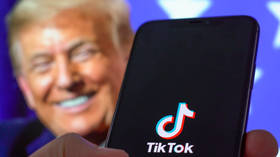Why are US lawmakers hell-bent on banning TikTok?
A bill moving through the House offers a mafia racket-style ‘choice’ to both the Chinese social media app and American digital distributors

TikTok is the world’s most downloaded social media app. With over 1 billion active monthly users, it has become a global sensation and surpassed other social media platforms to become the newest craze of its time.
But for American politicians, there’s one big problem with it that they have never accepted – it’s Chinese. TikTok was not created by a Silicon Valley company, as has been the case for all other social media apps, but a Chinese company called ByteDance. This has continually made it the subject of political paranoia in Washington, DC and an obsession with Republican politicians to try and ban it.
As is the case with most things from China, such politicians denounce it spuriously, without evidence, as a conspiracy by the Communist Party of China to infiltrate, influence, or spy on their country in some way. There has never been any serious evidence of wrongdoing by the app, yet the political narrative has continued because it is convenient to do so.
There have already been a number of failed bans against it, including a botched attempt by the Trump administration in 2020 which was struck down by a legal challenge, and then an effort to ban it at the state level in Montana, also defeated in court.
But the hysteria is not going away. Republican Representative Mike Gallagher, the head of the House Select Committee on the Chinese Communist Party, has introduced a new congressional bill which will once again attempt to effectively ban the video platform. The bill has advanced through the committee stage and is likely to get a floor vote. President Joe Biden has said he will sign the bill if it reaches his desk.
The act has produced outrage from TikTok’s 170 million users in the US who have bombarded their members of congress with calls to oppose the ban, but as with most things related to China in Washington, DC, it tends to fall on deaf ears. Gallagher insists that his bill is not an outright ban of TikTok – technically, what it envisions is making it illegal for distributors to provide apps controlled by ByteDance, and the company can choose to relinquish control to let TikTok stay in the US market. Obviously, this ‘choice’ is simply a mafia-style racket to force ByteDance to sell the most popular app in the world.
In other words, let the US smash and grab your social media product, or have it banned. It’s little more than legalized extortion, but this reflects a lot about the mentality of American politicians. America clearly has a big problem with the fact that one of its rival countries could create a globally acclaimed social media application. The US, after all, has until recently led the social media world hands down and there has been no contest, with Facebook, Twitter, and others all being American products which have changed the world.
The idea that China has created the next-generation social media app is a blow to the American ego, a ‘Sputnik’ moment that represents a shock to the American system comparable to the Soviet Union’s Cold War-era achievement. There is a fundamental difference here, however – in this case, America is not ‘looking in from the outside’ like it was at the standalone achievement of the USSR. TikTok has become a cultural sensation in America itself, and thus a projection of ‘soft power’.
It has become a defining characteristic of America’s struggle with China that the US in its own insecurity has increasingly responded by turning inwards in reaction to Beijing. Whereas during the Cold War, America turned outwards to compete, with its own cultural products, markets, aid, and support, here the US fears it cannot compete with China on many levels and instead resorts to negative measures, such as bans, blacklisting, sanctions, export controls, bad faith allegations, and forcing allies to endure costs, rather than giving them incentives.
This of course reflects the reality that China has pursued a very different strategy to the Soviet Union, one that has been premised on much more global economic and commercial engagement, as well as technological successes. TikTok is seen as an emblem of this, because if Chinese companies with their skills in AI are starting to beat the old guard of Silicon Valley now, what is going to happen in the future? Seemingly, US politicians have no answer to this other than to become defensive. It is likely, however, that even if the bill passes, the ban will once again fail to withstand legal scrutiny.
Such a ban creates problems for the First Amendment, because if the US government can arbitrarily ban a platform on the basis that it constitutes ‘propaganda’, then arguably, this creates a disturbing precedent which can be used to strike anything down. Yet the fact that politicians are so readily willing to ban something on this premise might tell us how insecure, paranoid, and seemingly unsettled they have become regarding the rise of China. It is fair to say that even if nothing comes of this potential ban, the issue of TikTok is going to keep ticking and won’t go away.
The statements, views and opinions expressed in this column are solely those of the author and do not necessarily represent those of RT.
https://www.rt.com/news/594096-tiktok-ban-us-china/


0 Comments:
Post a Comment
Subscribe to Post Comments [Atom]
<< Home